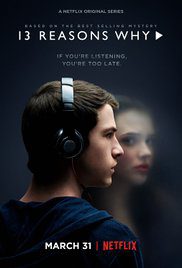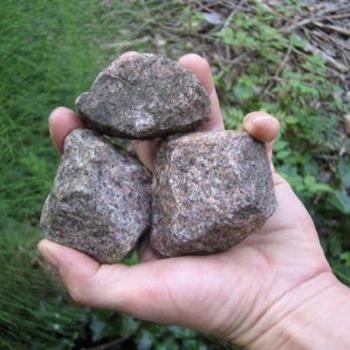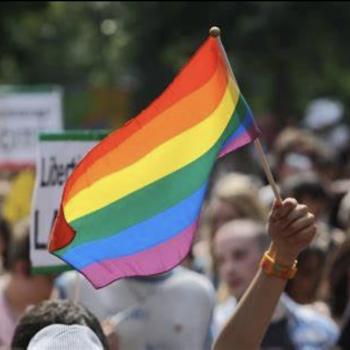(Two alerts. This review talks about rape, bullying and suicide. It also contains a lot of spoilers for the TV show and book, 13 Reasons Why.)
One of the terrible beauties of Holy Week is an invitation to not only enter the sufferings of Christ, but through our union with Him, be united with others in their suffering. This is not something we do willingly or embrace gladly. And, there are many areas of suffering we don’t wish to enter into or even consider.
Suicide is one of those topics. While I’ve never seriously contemplated taking my own life, I’ve very often found myself wishing not to wake up. And, as a father of three kids, a teenage boy and another son about to be, it’s a possible reality that keeps me up at nights. My ex-wife and I keep a close eye (probably too close for their comfort) on them, worried that our divorce will drive them to the most terrible act we can imagine. Mental illness runs in both of our families, so we are terrified that our gene pool will some day take over our kids.
I’ve had friends who’ve lost a fine young man who took his own life. I’ve counseled others who lost love ones when I was a Protestant minister. There’s nothing glorious or romantic about suicide. It’s an ugly and gross reality that is always a fresh wound, never fully healing. And the suffering it leaves behind is nothing short of devastation.
When I first heard about the upcoming Netflix show, 13 Reasons Why, based on the book by Jay Asher, I was skeptical for a few reasons. The marketing campaign around the show turned me off. It made the show seem like a teen drama on the CW. You know the one I mean: “This week on a very special episode of Dawson’s Creek.” Pop culture events centered on human tragedy are repulsive to me. Too often, books, movies and music seem to exploit people’s suffering to further careers.
Thankfully, Jay Asher is not that sort of man. A few weeks ago, I met him when we were both presenting at Teen Author Boot Camp, where he gave the keynote address to over 800 teen writers. I was struck by his humility and kindness, a rarity in an industry that is full of divas. Based on that meeting alone, I resolved to give 13 Reasons Why a chance.
The show and the book follows the story of Clay Jensen, who discovers a mysterious package on his doorstep. It contains seven tapes with 13 recorded sides. When he puts the tapes into an old Walkman to listen, he hears the voice of girl who committed suicide, a girl he’d tried to date. The voice informs him the tapes tell the story of why she committed suicide and who is responsible.
At first, it seems that Hannah suffers from a series of hard but typical teenage problems–false rumors, friends stabbing her in the back and a degree of bullying. But the story takes takes an awful turn when Clay discovers that she was raped by the same person who raped her former friend. It’s the final catalytic event that destroys the rest of her soul. We see the tragic circumstances as Hannah’s will to live is snuffed out and she loses hope, feels nothing and ultimately kills herself.
13 Reasons Why raises an important question: Are there things that people can do to prevent suicide? At first, I was afraid that Asher would reach for the simplistic answers. That is, if people are just kinder and nicer, parents listen more and other caring adults become less clueless, we can save kids (and others) from suicide.
But the people I’ve worked with are good people who constantly reached out to their troubled teens or loved ones. Are they perfect? Not in the least. But they tried, and it didn’t make a difference. To suggest they are solely responsible is a terrible cruelty. People struggle with unrelenting mental illness and depression and sometimes, tragically, it overtakes them. It’s sad. It’s terrible. But it’s a truth we can’t escape.
Asher, however, steers away from these simplistic conclusions. Hannah has great parents who, while they don’t always get things right, are loving and caring. Clay, in all his awkwardness, tries to reach out to her, although his male pride gets in the way. While there are terrible people who’ve done awful things to Hannah, there are also kind and loving people in her life. While Asher advocates for more communication and discussions with teens, he also recognizes that kids just don’t share everything with their parents. And in this, he recognizes that, sometimes, the worst happens.
There’s a reason this book has been on the New York Times best seller list for years. Asher opens the door for us to talk about rape, misogyny, male entitlement, disdain for “The Other,” and the choices we make that have terrible consequences for ourselves and for other people. When I finished the show and book, I wanted to talk with my teenage son, to tell him I’m very proud of the way he stood up to boys who sexually harassed a girl at his school. He did so at great personal risk to himself.
Maybe his actions will prevent this girl from sliding into the darkness, like Hannah did. There’s no guarantee of that. But in the battle against darkness, depression and mental illness, every friend with a kind word or action might make the difference. And maybe they won’t. But we should not let that stop us from trying.
Chances are, the teens in your life have read or heard about 13 Reasons Why and want to watch the show. Should you let them? That’s a complicated question for me. The scenes of Hannah’s (and another girl’s) rape and suicide are just brutal. Indeed, I had to fast forward through both of them, something I rarely do.
At first, I was a bit angry with the producers and directors for scenes that felt exploitative. But when I watched the “making of” segment after the show, I changed my mind. Rape destroys a part of a woman’s soul. And too often, even well meaning men are still only obsessed with the invasion of the body. But, Asher and the Netflix people show a very Catholic understanding of the body and soul. That is, what is done to one is done to the other. And suicide is tinged with the romantic notion of escape for some teens. 13 Reasons Why doesn’t let you hold on to either misconception. In both scenes, Katherine Langford shows Hannah’s soul going out and forces you to consider both violent acts for what they are and what they do to a person.
13 Reasons Why gave me a way to meditate on human suffering and Christ’s call to enter into the suffering of others. In the end, that’s something I want to teach my kids. Maybe they can’t prevent someone from taking their own life. But at the very least, they can show much needed love while walking with people who suffer. As Christ entered into our suffering, we can do no less. And we cannot avert our eyes from those who are struggling with depression, bullying, slut shaming or destroyed reputations. Instead, we must stare into the face of suffering, take it for others and bear their burdens.













